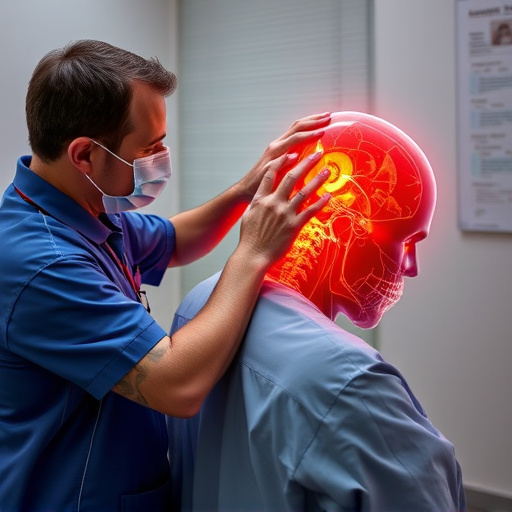Chronic cranial discomfort caused by conditions like whiplash can significantly impact daily life. A whiplash treatment specialist is key in providing accurate diagnoses and personalized management, addressing complex symptoms like headaches, facial pain, and cognitive issues. These experts use advanced tools, combining manual therapy, spinal manipulation, and targeted exercises to create holistic treatment plans, offering relief and improving quality of life for whiplash and other related injuries. Early detection through regular check-ups and preventative measures like lifestyle changes and stress management are also vital for effective management.
Chronic cranial discomfort (CCD) can significantly impact daily life, but specialized care offers hope for long-term relief. This article delves into the complex world of CCD, exploring its causes and symptoms, with a particular focus on the role of a whiplash treatment specialist in accurate diagnosis. We discuss advanced treatment options, emphasizing personalized care plans tailored to individual needs. Additionally, we share success stories and provide preventative measures, highlighting the transformative power of specialized care for those suffering from CCD.
- Understanding Chronic Cranial Discomfort: Causes and Symptoms
- The Role of a Whiplash Treatment Specialist in Diagnosis
- Advanced Treatment Options for Long-Term Relief
- Personalized Care Plans: Tailoring Solutions to Individual Needs
- Success Stories: Transforming Lives Through Specialized Care
- Preventative Measures and Management Strategies
Understanding Chronic Cranial Discomfort: Causes and Symptoms

Chronic cranial discomfort, often characterized by persistent headaches or facial pain, can significantly impact an individual’s quality of life. This condition may arise from various factors, with one common cause being whiplash, typically associated with car accidents or other traumatic events. Whiplash treatment specialists play a crucial role in diagnosing and managing such cases, as the symptoms can be complex and varied.
The discomfort may manifest as tension headaches, migraines, or facial pain around the temples, jaw, or eyes. Some individuals also experience sensitivity to light and sound, known as photophobia and phonophobia, respectively. Understanding these patterns and seeking expert advice from a whiplash treatment specialist is essential for effective management, ensuring relief and improved overall well-being.
The Role of a Whiplash Treatment Specialist in Diagnosis

A whiplash treatment specialist plays a crucial role in diagnosing and managing chronic cranial discomfort, especially following a whiplash injury. These experts are trained to assess a wide range of symptoms that may not be immediately apparent, such as headaches, neck pain, and cognitive issues. Using advanced diagnostic tools and techniques, they can pinpoint the source of discomfort, which is essential for developing an effective treatment plan.
By specializing in whiplash treatment, these professionals go beyond general healthcare practices. They employ specific protocols tailored to the unique challenges posed by whiplash injuries, ensuring that each patient receives personalized care. This specialized approach enhances diagnosis accuracy and improves outcomes for individuals suffering from chronic cranial discomfort related to whiplash.
Advanced Treatment Options for Long-Term Relief

In cases of chronic cranial discomfort, exploring advanced treatment options can bring much-needed relief for individuals suffering from prolonged symptoms. One such specialized area is whiplash treatment, which has evolved to cater to long-term issues. A whiplash treatment specialist focuses on addressing complex neck and head injuries often associated with vehicular accidents or sudden impacts. These specialists employ a range of innovative techniques, including advanced imaging, precise diagnostic tools, and tailored therapy plans.
By combining cutting-edge technology and personalized care, whiplash treatment specialists offer hope for those who have exhausted conventional methods. They utilize specialized treatments such as manual therapy, spinal manipulation, and targeted exercises to alleviate pain, improve mobility, and restore function. This holistic approach ensures that the root causes of chronic cranial discomfort are effectively managed, providing patients with lasting relief and an improved quality of life.
Personalized Care Plans: Tailoring Solutions to Individual Needs

Personalized Care Plans play a pivotal role in managing chronic cranial discomfort, especially for patients with conditions like whiplash. Unlike one-size-fits-all approaches, these tailored solutions consider each patient’s unique symptoms, medical history, and lifestyle. A whiplash treatment specialist will evaluate factors such as the severity of pain, specific triggers, and daily activities to design an individualized care plan.
This approach ensures that treatments like physical therapy, medication management, and alternative therapies are specifically targeted to address the patient’s most pressing needs. By personalizing care, patients can expect more effective relief from their chronic cranial discomfort, leading to improved quality of life.
Success Stories: Transforming Lives Through Specialized Care

Many individuals suffering from chronic cranial discomfort find hope and relief through specialized care, particularly from whiplash treatment specialists. These experts have successfully transformed lives by addressing complex issues that often elude conventional treatments. By employing advanced techniques and a holistic approach, they offer personalized solutions tailored to each patient’s unique needs.
Success stories abound, with patients reporting significant improvements in their quality of life. From reducing intense pain and headaches to improving overall mobility and cognitive function, specialized care has proven effective in managing even the most persistent symptoms. This transformative journey not only alleviates physical discomfort but also empowers individuals to regain control of their lives, fostering a renewed sense of well-being and resilience.
Preventative Measures and Management Strategies

Chronic cranial discomfort, often stemming from conditions like migraines or whiplash, can be effectively managed through a combination of preventative measures and tailored strategies. A whiplash treatment specialist plays a pivotal role here, offering advanced techniques to mitigate pain and improve quality of life. Early intervention is key; regular check-ups with a healthcare provider can help identify and address potential triggers before they escalate into debilitating symptoms.
Preventative care involves lifestyle adjustments such as maintaining good posture, practicing stress management techniques, and adopting a balanced diet rich in nutrients essential for nervous system health. Physical therapy, including specialized exercises and manipulation techniques, is another powerful tool. Additionally, education on recognizing and avoiding environmental factors that exacerbate discomfort, like bright lights or loud noises, empowers individuals to take an active role in their care.














